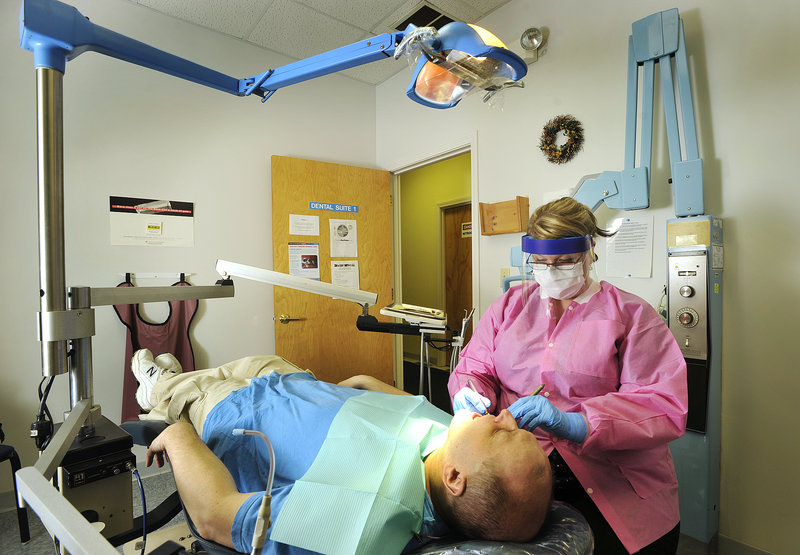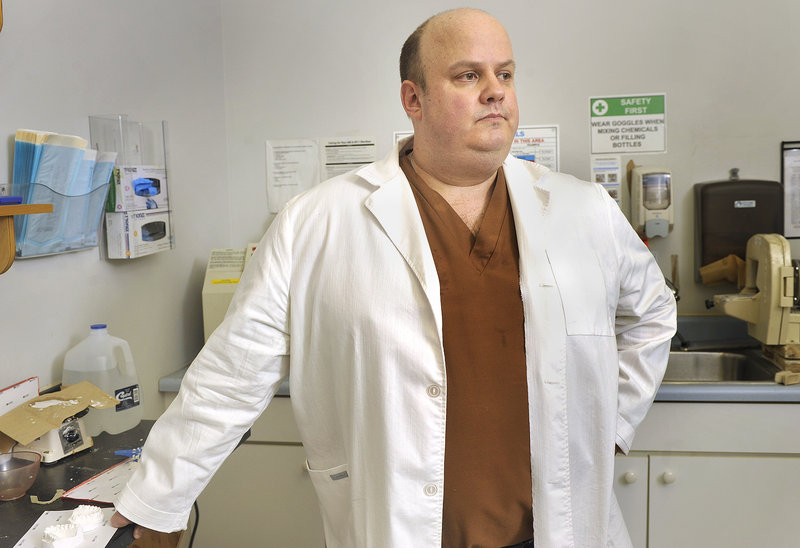PORTLAND – Rick Hagan counts on the specialized dental care offered at Clinical Services to keep his teeth clean and healthy.
Hagan, who lives in Bath and has bipolar disorder, is one of more than 3,000 people with mental illnesses or intellectual disabilities across southern Maine who visit the state-funded dental clinic at 63 Preble St.
Now, because Gov. Paul LePage’s proposed state budget would close the clinic in June, Hagan and other patients fear they will no longer have access to regular dental care. Hagan, 45, said he barely survives on Social Security disability payments and MaineCare, the state’s form of Medicaid.
“If I had to pay for dental care, it would pretty much clean me out,” Hagan said Thursday, while he was at the clinic to have his teeth cleaned. “I’m worried that LePage is hellbent on hurting people and getting rid of anyone who isn’t up to his standards.”
LePage’s office did not respond to a request for comment.
The planned elimination of the $800,000-a-year dental program is among $52 million in cuts that the LePage administration has proposed for the Department of Health and Human Services in a $6.2 billion budget for the two years that start July 1.
Staffers at the clinic hope the Legislature will find a way to fund the program.
Rep. Dick Farnsworth, D-Portland, House chairman of the Legislature’s Health and Human Services Committee, said, “This clinic provides critical dental care to a highly vulnerable population and we cannot just ignore it.
“If we can’t find another option to provide the care,” he said, “we may have to find a way to keep it open.”
The clinic opened in 1996 as an arm of the Augusta Mental Health Institute to serve patients who moved out of the institution and former residents of the Pineland Center in New Gloucester, said Dr. Mary Dowd, the clinic’s part-time director.
When AMHI closed in 2004 and was replaced by the Riverview Psychiatric Center in Augusta, the dental clinic became an arm of the new facility.
The clinic’s patients come from places like Farmington, Augusta, Topsham and Sanford — 25 to 30 people a day — seeking dental care delivered with large doses of compassion and understanding.
The clients have various special needs, including behavioral, cognitive and physical disabilities. Some are confined to wheelchairs. Others cannot speak. More than 500 require intravenous sedation to be able to sit still in the dentist’s chair.
“This is a challenging population to work with,” said Sherri Stanton, a dental assistant at the clinic. “A majority of our patients aren’t going to be able to get dental care anywhere else.”
The clinic also fills a coverage gap for many patients, said Timothy Towle, who has been the clinic’s full-time dentist for nearly 20 years.
All of the patients receive MaineCare. The program doesn’t cover routine dentistry such as cleanings and fillings, but the clinic can bill MaineCare because it’s considered part of a hospital.
MaineCare does cover emergency dentistry, which addresses pain or infection, but many dentists won’t accept MaineCare patients because the program reimburses dental care so poorly, Towle said.
“This is an important part of dentistry for an underserved and vulnerable population,” he said. “I’m proud of my work here, but I’m not sure what to do now.”
To develop Riverview’s budget for the next two fiscal years, the LePage administration focused on the center’s core services and trimmed anything considered extra, said DHHS spokesman John Martins.
“It was determined that the operation of a dental clinic was not closely aligned with the mission of a state psychiatric hospital,” Martins said in a written statement. “This is one of the difficult but necessary decisions that have been made in order to maintain priority services.”
Martins noted that Riverview patients who are hospitalized longer than six months do get dental coverage.
Before deciding to shut down the dental program, DHHS officials asked other dental care providers “whether they could assume additional patients from the (clinic).”
“Response to this request was positive and we are optimistic that many patients will be able to find services in the community, though these providers do not serve IV sedation patients,” Martins said. “The department is continuing to explore with providers the possibility of providing services related to IV sedation.”
The clinic’s seven staffers doubt that their patients will be welcome or comfortable at most dental practices. Without regular dental care, many patients will let minor dental issues grow into major problems and wind up in hospital emergency rooms, they say.
A study in 2010 by the Muskie School of Public Service showed that dental disease was the most common reason for emergency room visits by MaineCare and uninsured patients ages 15 to 44, costing the state more than $7 million.
Leaving dental disease unchecked also could drive up related health care costs, Towle said, because dental disease has been linked to health problems such as heart disease, diabetes and dementia.
While the clinic’s staff members are worried about the future care of their patients, they’re also concerned about being laid off in a tough job market.
“We worry about our patients because they really would lose a whole lot if this place closed,” said Lisa Roberson, office manager. “But we’d lose our jobs, too.”
Kelley Bouchard can be contacted at 791-6328 or at:
kbouchard@pressherald.com
Send questions/comments to the editors.





Comments are no longer available on this story